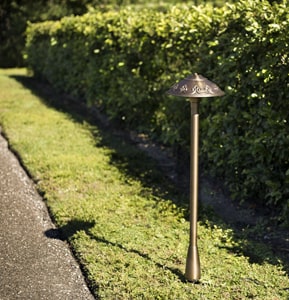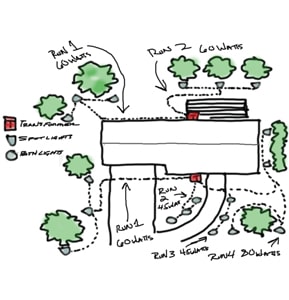
Today, most modern residential outdoor lighting systems use low-voltage fixtures (12V). This is mainly due to the fact that 12-Volt systems are easy for DIY homeowners to install, and they are also typically more budget-friendly compared to other lighting solutions. Of course, there are projects involving more complexity as well as homeowners and associations (HOAs) who prefer using line-voltage fixtures (120V) for lighting. Line-voltage systems generally offer brighter fixtures and they are ideal for areas where power needs to be evenly distributed over long distances.
Whether it involves a complex design or line-voltage lights, both will require the help of a licensed electrician. Although a licensed electrician may be needed for a project, most homeowners today would still prefer to have a say in the design and installation process. So, let’s review what you need to know for a project involving a professional contractor and how best to stay involved before, during, and after the project is completed.
What You Need to Know
 Do Your Research – Understanding the different lighting fixtures and the different features or benefits that each offer is key to giving your own input for the design of the project. Having some knowledge on this will help with your personal design planning as well as aid in how you can effectively communicate with and understand your contractor. As a general example, you should know that Path Lights offer 360-degree of illumination for path and area lighting, Spot Lights offer directional illumination for highlighting specific features, and that Flood Lights offer extremely widespread lighting for blanketing wide areas with light.
Do Your Research – Understanding the different lighting fixtures and the different features or benefits that each offer is key to giving your own input for the design of the project. Having some knowledge on this will help with your personal design planning as well as aid in how you can effectively communicate with and understand your contractor. As a general example, you should know that Path Lights offer 360-degree of illumination for path and area lighting, Spot Lights offer directional illumination for highlighting specific features, and that Flood Lights offer extremely widespread lighting for blanketing wide areas with light.
Finding the PRO – When searching for a professional contractor, there are a few things to consider. Looking at local service providers, you should be sure to read any recent customer reviews, look for portfolios to see the quality of their work, and check to see if they are licensed and insured. For any home improvement jobs, it is always best to select a professional, reputable company to ensure that quality work is done.
Get Estimates – For a project involving your house and your hard-earned money, don’t settle on the first estimate or quote that you receive for your project; get numerous quotes from the local PROs that you have done research on. From there, you should select the service that meets your needs and fits your budget the best.
How You Can Stay Involved
 Design – At the end of the day, you are the boss – the design should fit your needs. Keeping the intended designs in mind, coordinate with your contractor to use fixtures where you see fit. The contractor can handle the nitty-gritty design work; ultimately you just want to be sure that your main goals are met for the project.
Design – At the end of the day, you are the boss – the design should fit your needs. Keeping the intended designs in mind, coordinate with your contractor to use fixtures where you see fit. The contractor can handle the nitty-gritty design work; ultimately you just want to be sure that your main goals are met for the project.
Plan – As far as planning goes, other than possibly verifying any local codes or ordinances that your electrician may not know about, it is best to let the contractor do their thing and set up for the job how they normally would.
Install – It is important to prepare your property for the project and be ready to assist the contractor with whatever they may need whether it is guiding them to the main breaker panel of your home or, clarifying any additional details of the job. Some smalls steps which you can take to prepare your yard include: clearing away any debris where wires will be running or where fixtures will be installed and making note of where any preexisting wires or irrigation lines may be. Preliminary steps such as these will help speed up the project and can help prevent damage to pre-existing features of your yard.






